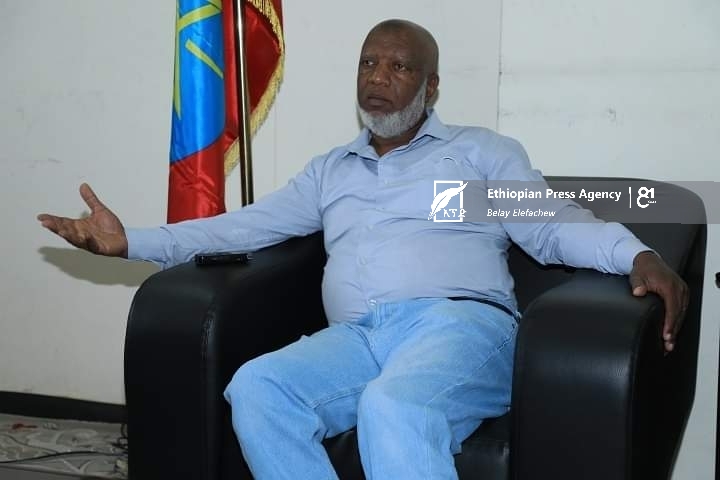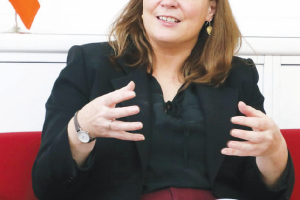
Ustaz Hassan Ali is well known among the public as a writer and translator of well-known religious works. He was also among the founders and managers of Africa multimedia production. The Ethiopian Herald had a brief stay with Hassan on Ethiopia’s historical heritages related to Islam, its reputation in the Islamic world and current situations in the country. Have a nice read!
Could you tell us how Ethiopia is known by the Muslim world?
Ethiopia has a very special status in the world. No country has such an opportunity that you can find different religions that come from different sources directly. When it comes to Islam it was introduced to Ethiopia before it was even introduced to the second holy city of Islam, Medina. Before it reached Medina it came to Ethiopia. It is a very good blessing, because those people who came to Ethiopia are not ordinary people but they are related directly to the prophet, and his families. So they are well known figure throughout Arabia and Africa, in the Islamic world. They are every much known so Ethiopia had an opportunity to host these people to give them …, to exercise their religious right. So this story is very much known in the entire Islamic world.
Once I met an Egyptian man and he told me “If that was part of Egyptian history we would have declared it a national holiday” So Ethiopia has a very unique opportunity but we couldn’t possibly exploit that to our advantage.
What were the Hindrances?
In different times in Ethiopia the different governments that ruled the country had a very deep hatred, deep suspicion, but not among the people. The people live very well. That is what keeps us moving. But the politicians including the Royal Family, all of them tried to exploit this to their own advantage by dividing the people so that they could rule them. That is why they don’t want to bring this history to the forefront. Instead of bringing it to the forefront and flourish they kept it as a divided people.
So they didn’t accept it from their heart. The history is there. But it should be the government that should have promoted it. Even today some parts of the elite do not want that to be integrated. Once a government official said “Whatever a benefit comes from accepting the story, we would rather get nothing.” This is prejudice. That is what hinders it. Otherwise this history is enshrined in the whole Islamic world. Whenever we are out of Ethiopia we are very much respected as Ethiopians. In Turkey when they meet someone from Ethiopia, they kiss the hands. Their mosques, Charitable Organizations, streets are named after Nejashi … etc. You can find in the whole Islamic world paying tribute to the history. But we, the ones who owned it do not know that much. It has to change.
What can we do about it?
Four years ago, the former government tried to promote something. For the first time the hadj package tried bring people to visit Nejashi mosque in Tigray. So the mosque was renewed. Before visitors go to Mecca, they have to drop in there and visit that place and then to Mecca. That package was announced. When these things were launched through the Ethiopian Islamic Affairs Higher Commission, a number of people came and visited that place from Turkey and West Africa. About 350 thousand people expressed interest to come there. Ethiopia would have got a lot of opportunity. Unfortunately, there was conflict with the government and opposition and they could not go.
What do you say about Ethiopia’s Islamic historical heritages at home and abroad?
Ethiopia’s Islamic heritages are very much recognized by the outside world. Unfortunately it is not even well known amongst Ethiopians. If you go to Shonke for example, if you go to Harrar, Diredawa, Bale you can find lots of heritages that could be of interest to Ethiopia.
But they are not cultivated. There are good starts now and then. Unfortunately the value we had is more known by people from outside. When they come and discover it how come we don’t know about it?
If you go to Shonke it is equal to the Maya, people of Latin America, who build their houses in high places. The same thing is available in Shonke. The place is about 800 years. Still now some 250 families live there. The rest have gone to other places. But still it is habitable. But it is very amazing.
How is thecurrent situation of Ethiopian Muslims holdings in Mecca that was established by Jimma Abba Jifar?
It was first bought by Jimmaa Aba Jiffar about 150 years ago, so that Ethiopian pilgrims would rest there. But the place was needed for expansion of the hadj place and removed from the original site. It has been removed two or three times. It was near the Kaaba. Now it is a very big building that accommodates about 850 pilgrims. Otherwise throughout the years it gives service to other persons. It is still Ethiopia possession, but administered by Saudi and Ethiopians. The family of Aba Jiffar are still in charge of administration of the place.
Currently some Islamic Banks have started operating in Ethiopia. How do you think is the economic advantage the country would gain from this?
For a long time there was question. At the end of the day it stopped. At that time everything was going well. At the end the government said it has taken a political decision to stop it. As a result the organizers of the establishment of the bank were not able to open it. So the money was returned to the people and were very disappointed. Now it is allowed. Three of them are launched. There were so many who were skeptic about Islamic banks. They thought that if the interest free banks come the Muslims would keep the money there and the economy… it is controlled by some groups, there would be confrontation with others and there were a lot of questions that we should have our own banks.
But we can see that other private banks have flourished very much, they have depth. But Islamic banks are late comers, they are trying to address many problems. That is given them interest free services. And those service not only for Ethiopians in the long run lots of people in the Middle East and Asia would the ones who would be bringing money to Ethiopia. So Ethiopia will benefit from a lot of other sources. This should have been through earlier by the government. The initiative should have been thought by the government, rather than Muslims. It should have come from the government. Those things should have been exploited earlier. The main problem in the Ethiopian economy is making balance between import and export. They are working hard to balance this. Now a days it is a good beginning. We are on the right track. If we work hard the benefit will be harvested very soon. Previously they cannot think big because the amount of money they have was very small.
After Nejashi and Bilal, what does the world know about Ethiopian Muslims contribution to Islam during the last 1400 years?
Ethiopian scholars are not known locally by Ethiopians, but they are well known in the Arab world. Their scholar works are very much known in the entire Middle East. That is their books, their researches is there all over the Middle East Universities. That is well known and have deep root in Ethiopia. In the past many foreigners used to come to Ethiopia. They used to come here and learn. These places are well known. But here in Ethiopia it is not that respected. It is Ethiopia that gives the renaissance of Islam, a lot of things. If these are properly place they can allow Ethiopia to be well known.
What do you think should be the role of religious leaders, religious scholars in consoling the people during this trying time?
The first thing we should understand is that the challenge is not only in Ethiopia. The whole world is in trouble. Even Europe and America are in trouble. Americans have never seen the current level of inflation in the last 40 years. We are not different. We hear around the world in Africa, Asia, Europe, Latin America they have very big problems. It is the amount of problem that makes the difference. We should understand that when it comes to economic or political problems, we are not the only country in trouble.
How we are trying to pass this time? The culture of helping each other is enshrined in our culture. In some countries poor people could not survive problems and take action to the extent of selling organs. But in Ethiopia if there is no food in one house, they can get from the other house. Regardless of what you have what you wear, what your religion, anybody can support you. You don’t have to sell your organs. It is not because we are rich. But we share because our culture. That is how we are passing this time.
When we come to the political issues, we have come a long way and I am very much optimistic. Indeed there is a problem. For example in the past three years there were three million internally displaced people. Now we don’t see that, especially this religion issue. The incidents that we see in some parts of the country are not religious but political. Hey are trying to use religion as a cover up. But the incidents should be addressed on time. When something happens in one place, it should not go unnoticed. It should rather be investigated deeply and brought to justice.
So we might have grievances or differences. But we can solve our problems only if we have a country. IF we don’t have a country there is no place even to sit and discuss problems. So the first thing is let this time pass. There is always time to solve the problems. Problems cannot be solved now as they were created during the last 50 to 60 years. You cannot solve them in 5 or six years. It takes a lot of time to solve things properly. We have to have patience.
Finally is there any message you would like to send to the Muslim community?
Eid Al Fitr is one of the two important holidays in Islam. We fast during the last 30 days and during the 30 days we share with people, the needy. It is what kept us together. We have to keep hem increasing. The problem is here. It is not going to go away soon. So we have to think about others.
I wish Muslims in and outside Ethiopia a happy eid. I hope we will overcome our problems and hand over a good country for our children. I am optimistic that things would improve. And thank you for inviting me.
Thank you too, for allowing us your time; and we wish you happy eid!
BY ZEKARIAS WOLDEMARIAM
The Ethiopian Herald 30 April 2022





